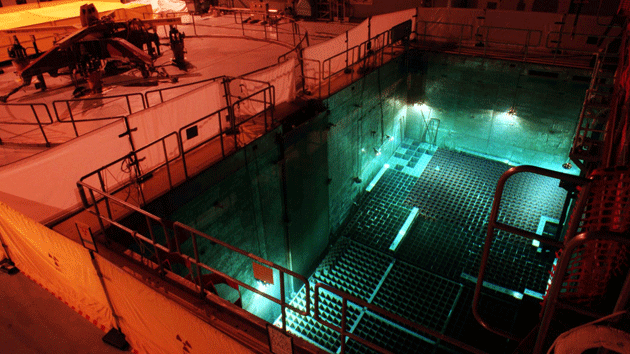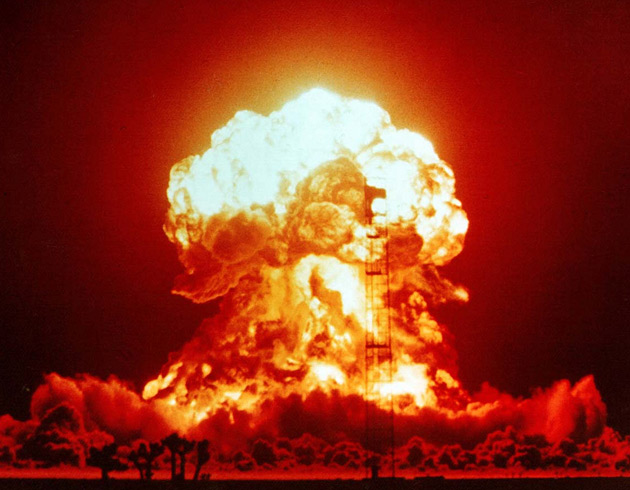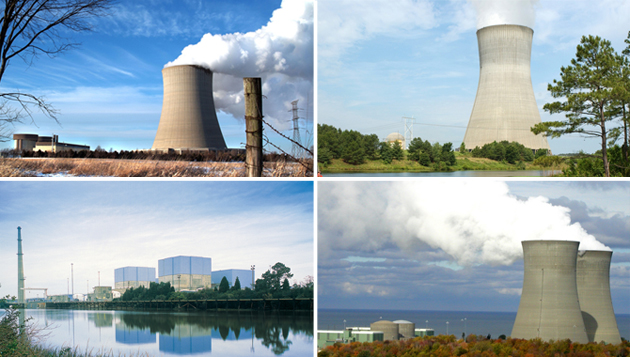
The spent-fuel pool at Duane Arnold Energy Center in Palo, IowaAP
Strict safety controls sought by environmental groups for the storage of radioactive waste at dozens of nuclear power plants may fall to the wayside under a rule that’s expected be approved by the Nuclear Regulatory Commission next week. According to a congressional source who does not wish to be identified, the NRC is rushing to vote on the rule before the September retirement of Commissioner William Magwood, an ally of the nuclear power industry.
The rule would establish that the environmental risks of storing spent fuel in pools of water at reactor sites for extended periods are negligible and for the most part don’t need to be studied as part of the licensing requirements for nuclear power plants. But critics of the rule say that the NRC is blatantly ignoring its own research, which shows that the practice could lead to serious disasters: “You will have all the waste sitting, basically, in a giant swimming pool,” the source says, “and the potential of the swimming pool draining or being breached by an accident or an attack or a power loss that causes the water to boil off—all of those things would have impacts that the NRC’s own analysis says would equal that of a meltdown of the reactor core.”
Existing nuclear plants are designed to store spent fuel for no more than a few years but have accumulated large stockpiles of it due to repeated delays in plans to build a permanent repository in Nevada’s Yucca Mountain. In 2010, the Obama administration canceled the $15 billion Yucca project, raising the distinct possibility that a single geologic waste storage site may never be built. In 2012, the Natural Resources Defense Council successfully sued to force the NRC to stop licensing nuclear reactors until the commission conducted an environmental impact study on the long-term risks posed by on-site waste—including the possibility that those temporary storage sites will become permanent. The completed study, along with the new rule, is expected to be approved by the NRC on Tuesday, over the strong objections of environmental groups.
The NRC rule would pave the way for nuclear waste to be stored in open cooling pools at reactor sites for up to 120 years—and up to 60 years after a reactor is decommissioned. Environmental groups say that’s way too long. “The pools are a catastrophic risk,” says Kevin Kamps, the radioactive-waste watchdog for a group called Beyond Nuclear. Many pools are holding up to four times as many spent rods as intended. Packing so many rods into the pools dramatically increases the risk of a fire should a leak cause the cooling water to drain. A 2013 NRC study found that a pool fire could contaminate 9,400 square miles and displace 4 million Americans from their homes for years.
The NRC’s assumption that operators will guard and maintain their waste for decades after their plants are decommissioned is laughable to many enviros. In comments submitted to the NRC last December, the NRDC pointed to “the sad history” of managing hazardous waste in America, which often involves commercial operations going bankrupt and saddling taxpayers with the cleanup.
Even at operable nuclear plants, about a dozen waste storage pools are known to be leaking, including one at New York’s Indian Point reactor, which is discharging radioactive water into the Hudson River. To minimize the risk of disaster, environmental groups want the industry to immediately move its waste into thick concrete-and-steel dry casks at a cost of roughly $7 billion. But in a 4-1 vote earlier this year, the NRC ruled that this wouldn’t be cost-effective.
NRC spokesman David McIntyre denied that the commission is rushing to vote on the waste rule before the retirement of Commissioner Magwood, who joined the commission in 2010. Earlier this year, Magwood said he would accept a job as director general of the Paris-based Nuclear Energy Agency, an association of governments that sponsor, and in some cases own, American companies licensed to operate nuclear power plants. In a letter to the White House last month, the Project on Government Oversight complained that Magwood’s failure to step down from the NRC after accepting the NEA job represented a “glaring conflict of interest.”
In a response circulated by the NRC, Magwood claims that the NEA “is primarily a research and policy agency” and that his future job doesn’t affect his impartiality.
Yesterday, 34 environmental groups called on the NRC to delay its vote until Magwood steps down. His retirement comes amid a broader shakeup of the NRC panel: Commissioner George Apostolakis’ term ended last month and was not renewed by the White House. The two vacancies on the five-member commission will be filled by Jeffrey Baran, an aide to Rep. Henry Waxman (D-Calif.), and former NRC general counsel Stephen Burns.
Environmental groups hope the new commission will break with its industry-friendly past. “The industry crawls all over that place in terms of lobbying,” Kamps told me. “They own that place.”
UPDATE: NRC spokesman David Mcintyre asked Mother Jones to clarify that the Tuesday’s vote will not automatically allow nuclear reactor operators to store spent fuel on-site for extended periods. Before receiving licenses to do so, plant operators must demonstrate adherence to accepted safety standards, he says.













